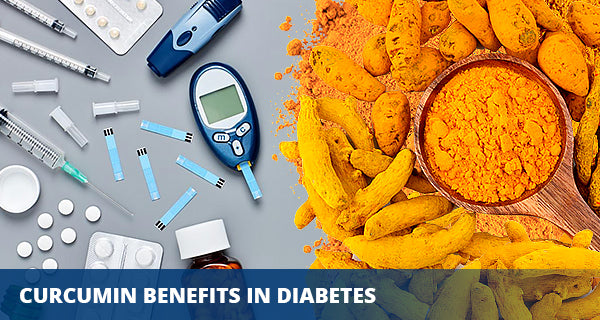Curcumin Benefits in Diabetes (SQ-73)
Many high-quality studies show that health benefits of curcumin are enormous, especially for the heart and brain. And much of curcumin’s competence in keeping your body overall healthy comes from its ability to reduce oxidative damage (as a powerful anti-oxidant) and curb pain and inflammation.
Curcumin, the main bio-active compound found in turmeric, has also received considerable attention in managing diabetes and associated complications. While the wholistic healing system of Ayurveda already describes curcumin as an effective therapeutic agent to manage diabetes, new studies also show that curcumin supplements may be a better therapeutic strategy than conventional drugs in not only treating but also preventing type 2 diabetes.
Diabetes is a chronic metabolic condition where either your body can’t produce enough insulin, or it can’t properly utilize insulin. What does insulin do?
Your body converts the food you eat into glucose, which then makes its way into the bloodstream. When the levels of glucose rise in the blood, it is a cue for the pancreas to release insulin, a hormone that helps the cells to pick the available glucose and use it for their energy requirements. This lowers the amount of glucose circulating in the bloodstream. With continuously high levels of sugar circulating in the blood, cells stop accepting this sugar payload and develop resistance to circulating insulin – creating a vicious cycle of high sugar and insulin levels.
This is called insulin resistance.
Diabetes and chronic inflammation
High blood sugar causes oxidative damage to blood vessels and triggers inflammatory processes in the body. Excess sugar circulating in the bloodstream cross-links with proteins and lipids to form Advanced Glycation End Products or AGEs. Your body can’t identify these abnormal proteins as its own and alerts the immune system to fight and get rid of these AGEs – initiating a cycle of inflammatory responses and eventually causing chronic inflammation in the blood vessels and other tissues.
Oxidative stress and chronic inflammation underlie many diseases including cardiovascular disease, insulin resistance, obesity and type 2 diabetes. And as a powerful anti-oxidant and anti-inflammatory, curcumin plays a significant role in managing diabetes and insulin resistance.
Curcumin in diabetes
An exhaustive review of studies showed that curcumin exerts remarkable anti-diabetic effects through a range of mechanisms: [1]
- Stimulates insulin production
- Improves insulin sensitivity
- Lowers blood sugar
- Reduces inflammation
- Protects beta cells from oxidative damage and improves their activity
- Activates AMP kinase, an enzyme that increases glucose intake
- Reduces glucose production in the liver
Curcumin reduces inflammation
A 2014 study published in Biomedical and Environmental Sciences showed that curcuminoid supplementation reduces the levels of adipocyte-fatty acid binding protein (A-FABP), that belongs to a family of proteins that transport fatty acids and plays an important role in mediating inflammatory processes. The study reported “significant decreases in serum A-FABP, C-reactive protein (CRP), tumour necrosis factor-α, and interleukin-6 levels.” [2]
In addition, a 2013 study demonstrated that curcumin also reduces free fatty acids (FFAs) in the bloodstream, thereby lowering blood glucose and improving insulin resistance. The study concluded that “glucose-lowering effect of curcuminoids in type 2 diabetes, which is partially due to a decrease in serum FFAs, which may result from promoting fatty acid oxidation and utilization.” [3] Free fatty acids trigger inflammation and disrupt insulin release and glucose utilization from the blood.
Curcumin prevents the onset of diabetes
A 2012 study published in Diabetes Care found that curcumin can prevent diabetes in people with prediabetes. [4] The team discovered that curcumin protects pancreatic beta cells from oxidative stress caused by free radicals and improve their function.
In the group treated with curcumin, everyone improved their beta cell functions, insulin sensitivity, glucose tolerance and A1C levels or blood sugar levels.
Curcumin reverses type 2 diabetes
A 2009 study found that curcumin may be more powerful that Metformin, the most common anti-diabetic drug. It showed that curcumin can help reverse type 2 diabetes by activating AMP-activated protein kinase or AMPK (a master enzyme that regulates metabolism). AMPK improves insulin sensitivity and enhances glucose uptake by the cells. Curcumin also supress the expression of the gluconeogenic gene, which is involved in the production of glucose in the liver.
Another study found that turmeric supplementation, when used as an adjunct with metformin, showed positive effects on “blood glucose, oxidative stress and inflammation.” [5]
References:
- Ghorbani et al. Anti-Hyperglycemic and Insulin Sensitizer Effects of Turmeric and Its Principle Constituent Curcumin. Int J Endocrinol Metab. 2014
- Na Lx et al. Curcuminoids Target Decreasing Serum Adipocyte-fatty Acid Binding Protein Levels in Their Glucose-lowering Effect in Patients with Type 2 Diabetes. Biomed Environ Sci. 2014
- Na Lx et al. Curcuminoids exert glucose-lowering effect in type 2 diabetes by decreasing serum free fatty acids: a double-blind, placebo-controlled trial. Mol Nutr Food Res. 2013
- Somlak Chuengsamarn, Suthee Rattanamongkolgul, Rataya Luechapudiporn, Chada Phisalaphong, and Siwanon Jirawatnotai. Curcumin Extract for Prevention of Type 2 Diabetes. Diabetes Care. 2012.
- KSN Maithili et al. Efficacy of Turmeric as Adjuvant Therapy in Type 2 Diabetic Patients. Indian J Clin Biochem. 2015
Disclaimer
Information on our websites, in our blogs and our emails are provided for informational purposes only, and have not been evaluated by the EMA, EFSA or FDA. It is not meant to substitute medical advice provided by your healthcare professional and is not intended to diagnose, treat, cure, or prevent any disease. Our products are intended for adults, 18 years of age and older. While the vitamins and supplements mentioned here have been shown to have various health benefits, it is important to remember that supplements and dietary changes should be considered as part of an overall health plan and not as a substitute for professional medical treatment. Only a qualified healthcare practitioner can provide personalized advice and treatment plans based on your individual health needs and medical history, and you should seek advice from your healthcare professional before taking product(s) if you are pregnant or nursing.


